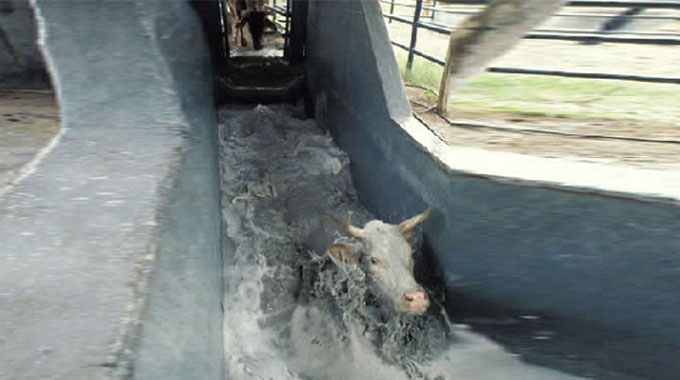Farmers must dip their cattle regularly to avoid unnecessary deaths

THE country has been very wet since the beginning of last month.
As a result, crops are thriving all over.
Farmers are delighted at the prospect of a bumper harvest, a second successive one.
Dams whose water is used for irrigation in the dry season are full, many of them spilling.
Pastures are great too.
Therefore, the year promises to be a big one agriculturally.
But heavy rains such as those we are receiving always come with a few known challenges.
Since heavy rains are good for life in general, they also give rise to considerable pest and weed infestation.
Farmers are happy that rains are falling, but are struggling to control weeds that thrive in the wetness.
Weeding is proving difficult given the massive rate at which weeds are growing.
Leaching is another challenge arising from the plentiful rains, so is water logging.
To fight back leaching, farmers have to spend much more buying and applying top dressing fertiliser in their fields.
In terms of livestock production, ticks flourish during wet periods such as one we are in.
As ticks thrive, they cause January disease, that highly dangerous cattle disease that is capable of wiping off a farmer’s herd within days if the producer does not take corrective measures on time.
Our sister paper, Sunday News reported yesterday that already almost 400 head of cattle had died of January disease in Masvingo since last month.
Also, a columnist for the same title penned an insightful piece to urge farmers and Government as well to move with speed to curb the disease.
Furthermore, agriculture officials in Matabeleland South reported late last month outbreaks of theileriosis, the tick-borne cattle disease commonly known as January disease.
By then parts of Insiza district, namely Lancaster and Gwatemba, had reported 43 cattle deaths attributed to January disease.
Provincial veterinary services officer, Enat Mdlongwa said some parts of the region where outbreaks of theileriosis had been reported had been quarantined.
“One farmer in Insiza lost 17 cattle before moving the remaining herd to Lancaster Farm and of that 20 have since died.
So we are carrying out an awareness campaign to tell farmers about a possible outbreak of theileriosis and we advise farmers to dip their cattle regularly,” he said.
The Sunday News columnist wrote:
“We are a cattle country, meaning this is our source of livelihood and our store of value.
We invest in cattle and any decimation of this sector will result in wholesale loss of massive investment by farmers.”
We are profoundly concerned about the resurgence of January disease in parts of the country.
Outbreaks have been reported in Masvingo and Matabeleland South but we fear that there are many more nationwide with some cattle dying as a result.
We worry much because this disease is very preventable yet it is a threat to the people, and nation’s wealth.
Farmers can prevent it by regularly dipping their animals.
We implore them to do so, so that they protect their stock.
They need to take advantage of the Government’s investment in dipping facilities and the tick grease that is being distributed.
In cases where public dipping facilities and services are unavailable, especially in newly-resettled areas, we urge farmers in those areas to take the initiative by buying dipping chemicals that are easily available at veterinary dealers near them.
It makes sense for them to spend US$20 buying dipping chemical or tick grease and use the chemicals to protect scores of their herds worth tens of thousands of dollars.












Comments